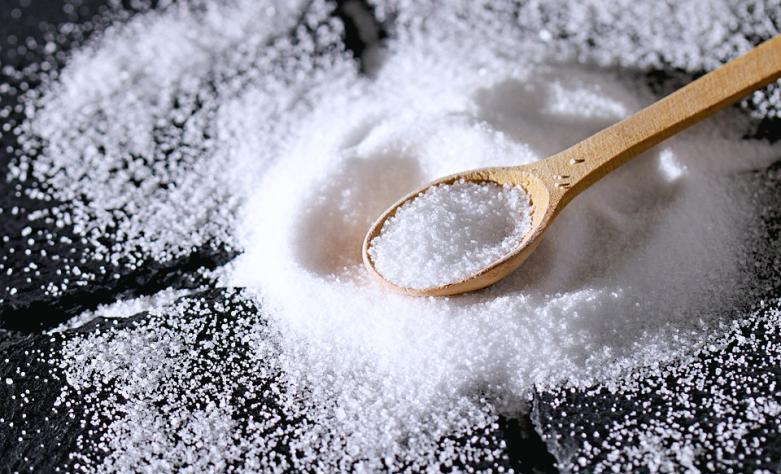Salt as a daily "must-eat" food, to add flavor to food, excessive intake of salt may bring health risks to people. For example, heart disease, stroke, etc., about 3 million people die every year due to these two diseases.
According to the World Health Organization (WHO), adults should consume no more than 5 grams of salt per day. However, because salt intake cannot be accurately assessed, people have different degrees of salt "exceeding the standard" ingestion. Recently, a scientific team found that salt intake may affect blood flow in the brain.

(Source: Pixabay)
The Georgia State University team conducted a study of how blood flow to the hypothalamus changes with salt intake, and the study was the first to find an association between neuronal activity and blood flow deep in the brain, and the effect of salt intake on brain activity.
Figure 丨 Related Papers (Source: Cell Reports)
On November 2, the paper was titled "Inverse neurovascular coupling contributes to positive feedback excitation of vasopressin neurons during a systemic homeostatic." challenge) was published in Cell Reports.
Surprising finding: reverse neurovascular coupling
Normally, once a neuron is activated, it dilates through the arterioles of the brain, causing blood flow to the region to rise for a short period of time, a process known as "neurovascular coupling" or "functional congestion."
So, how do experts diagnose brain diseases? In areas of the brain where blood flow is weak, they use functional magnetic resonance imaging (fMRI) to determine the condition of brain diseases.
However, previous neurovascular coupling studies have focused mainly on it
In the surface areas of the brain ( such as the cerebral cortex ) , the main direction focuses on how blood flow changes and patterns with sensory stimuli from the environment ( such as visual or auditory stimuli ) . Has blood flow ever been coordinated in deeper areas of the brain with stimuli (called "intrinsic sensory signals") produced by the body? There are not many conclusions to refer to.
Figure丨 Two-photon imaging of the SON microcasculature (Source: Cell Reports)
The paper's corresponding author, Javier Stern, a professor of neuroscience and director of the Center for Neurological and Cardiac Metabolic Diseases at Georgia State University, developed a new approach to study the relationship between these problems in deep regions of the brain.
This approach uses state-of-the-art neuroimaging and then combines relevant surgical techniques and states. The team's research focuses on key bodily functions involving drinking, eating, thermoregulation and reproduction, which is a deep region of the brain, the hypothalamus.
So how did they come up with the idea of looking at the relationship with blood flow to the brain by studying salt intake?
In this regard, Stern gave the answer: "We chose salt as one of the research elements because the human body needs to control sodium content very precisely. The body even has specific cells that can detect the salt levels in the blood. When people consume salty foods, the brain feels it and activates a series of compensatory mechanisms to lower sodium levels. ”
Javier Stern (Source: Georgia State University)
The body activates neurons, turning on the "switch" of vasopressin to promote this "compensatory mechanism." Vasopressin is one of the antidiuretic hormones and plays an important role in the balanced regulation of salt concentration.
Previously, scientists concluded that in the cerebral cortex, neuronal activity increases with the increase of blood flow, that is, there is a positive correlation between the two. The team experimentally found that once neurons are activated in the hypothalamus, blood flow decreases. The results surprised them, and the researchers called this phenomenon "reverse neurovascular coupling," meaning that as neuronal activity increases, it leads to a decrease in blood flow that lacks oxygen.
"This finding surprised us because in the study we observed vasoconstriction, which is the opposite of the response of the cerebral cortex to sensory stimuli described in most studies." After Alzheimer's disease, stroke, or ischemia, a decrease in blood flow is usually observed in the cerebral cortex. Stern said.
They also observed other different phenomena in the cerebral cortex and hypothalamic regions: in the cerebral cortex, the vascular response to stimuli is limited, which allows its expansion to occur rapidly in a short period of time; in the hypothalamus, the vascular response to stimuli is diffuse and occurs long and slowly in terms of the rate of expansion.
Stern said, "When we eat a lot of salt, our sodium levels will remain elevated for a long time. We believe that hypoxia is a mechanism that enhances the ability of neurons to respond to sustained salt stimuli, allowing them to remain active for long periods of time. ”
Depression, obesity and neurodegenerative diseases may be further studied
One of Stern's research focuses is to elucidate how structural and functional remodeling within critical neuronal networks works in the pathophysiology of hypertension, heart failure, diabetes, and obesity.
In general, 50% to 60% of hypertension is thought to be due to excessive salt intake, meaning that hypertension is closely related to salt intake. These new findings inspired him to ask for further research – is hypertension related to this mechanism?
Therefore, the team hopes that in the future it will be possible to confirm in animal models whether the "reverse neurovascular coupling mechanism" is helpful for the pathology of hypertension. They also plan to study other brain diseases, such as depression, obesity and neurodegenerative diseases, in this way.
"If the body consumes a lot of salt for a long time, the neurons that stimulate the release of vasopressin will become overactive. This mechanism can lead to excessive lack of oxygen in the brain and even tissue damage. If we can better understand this process, we can design new targets to prevent this from happening and potentially improve the prognosis of patients with salt-dependent hypertension. Stern said.
-End-
reference:
1.Ranjan K. Roy et al. Cell Reports, 37 (5): 109925(2021). DOI: 10.1016/j.celrep.2021.109925
https://www.sciencedaily.com/releases/2021/11/211111154256.htm